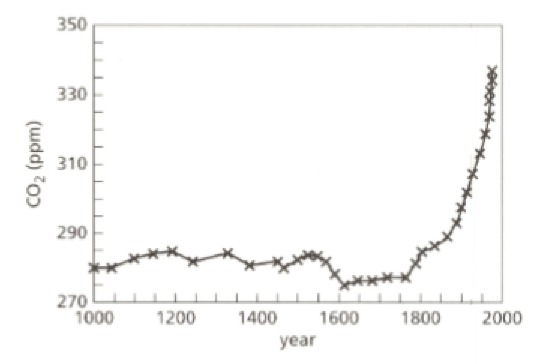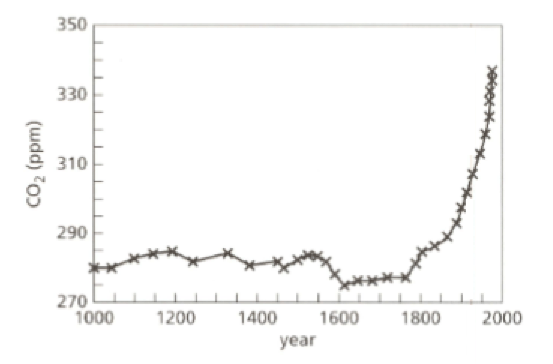Aidan Gill, Heidi Foxford and, Dorothy Warren Solutions for Chapter: Chemical Reactions, Exercise 3: Exercise 3
Aidan Gill Science Solutions for Exercise - Aidan Gill, Heidi Foxford and, Dorothy Warren Solutions for Chapter: Chemical Reactions, Exercise 3: Exercise 3
Attempt the free practice questions on Chapter 6: Chemical Reactions, Exercise 3: Exercise 3 with hints and solutions to strengthen your understanding. Cambridge Lower Secondary Science Stage 8 : Workbook solutions are prepared by Experienced Embibe Experts.
Questions from Aidan Gill, Heidi Foxford and, Dorothy Warren Solutions for Chapter: Chemical Reactions, Exercise 3: Exercise 3 with Hints & Solutions
Look at the graph. It shows how the proportion of carbon dioxide gas in the atmosphere has changed over the past years. The unit ‘ppm’ means parts per million.

- Describe how the proportion of carbon dioxide changed between and .
Look at the graph. It shows how the proportion of carbon dioxide gas in the atmosphere has changed over the past years. The unit ‘ppm’ means parts per million.

- Give a reason which might explain the changes after the year .
Candle investigation:
Mr Yung’s class are investigating candles. He sets up the following equipment and asks the students to make a prediction.
Mingxia thinks the candles will burn for the same time because the beakers are the same size. Elizaveta thinks the shortest candle will go out first because the carbon dioxide produced will sink to the bottom of the beaker and put the flame out.

- Explain why Elizaveta thinks that the carbon dioxide will sink?
Candle investigation:
Mr Yung’s class are investigating candles. He sets up the following equipment and asks the students to make a prediction.
Mingxia thinks the candles will burn for the same time because the beakers are the same size. Elizaveta thinks the shortest candle will go out first because the carbon dioxide produced will sink to the bottom of the beaker and put the flame out.

- EpIain why Mr Yung chose beakers that were the same size?
Candle investigation:
Mr Yung’s class are investigating candles. He sets up the following equipment and asks the students to make a prediction.
Mingxia thinks the candles will burn for the same time because the beakers are the same size. Elizaveta thinks the shortest candle will go out first because the carbon dioxide produced will sink to the bottom of the beaker and put the flame out.

Each group timed how long it took for the lighted candles to go out. Here are the results from Mingxia’s group.
| Candle length in | Time candle burned in seconds | |||
| Experiment | Experiment | Experiment | Mean | |
| _____ | ||||
| _____ | ||||
- Complete the table by working out the mean results. The first one has been done for you.
Candle investigation:
Mr Yung’s class are investigating candles. He sets up the following equipment and asks the students to make a prediction.
Mingxia thinks the candles will burn for the same time because the beakers are the same size. Elizaveta thinks the shortest candle will go out first because the carbon dioxide produced will sink to the bottom of the beaker and put the flame out.

Each group timed how long it took for the lighted candles to go out. Here are the results from Mingxia’s group.
| Candle length in | Time candle burned in seconds | |||
| Experiment | Experiment | Experiment | Mean | |
| _____ | ||||
| _____ | ||||
- Write a conclusion by comparing the means of the results.
Candle investigation:
Mr Yung’s class are investigating candles. He sets up the following equipment and asks the students to make a prediction.
Mingxia thinks the candles will burn for the same time because the beakers are the same size. Elizaveta thinks the shortest candle will go out first because the carbon dioxide produced will sink to the bottom of the beaker and put the flame out.

Each group timed how long it took for the lighted candles to go out. Here are the results from Mingxia’s group.
| Candle length in | Time candle burned in seconds | |||
| Experiment | Experiment | Experiment | Mean | |
| _____ | ||||
| _____ | ||||
- Comment on the quality of the data collected in the different experiments.
Candle investigation:
Mr Yung’s class are investigating candles. He sets up the following equipment and asks the students to make a prediction.
Mingxia thinks the candles will burn for the same time because the beakers are the same size. Elizaveta thinks the shortest candle will go out first because the carbon dioxide produced will sink to the bottom of the beaker and put the flame out.

Each group timed how long it took for the lighted candles to go out. Here are the results from Mingxia’s group.
| Candle length in | Time candle burned in seconds | |||
| Experiment | Experiment | Experiment | Mean | |
| _____ | ||||
| _____ | ||||
- Suggest two ways you could improve the experiment.
